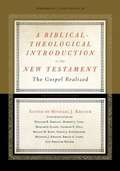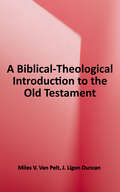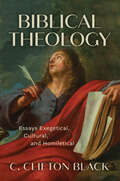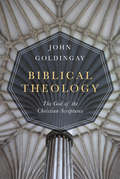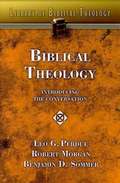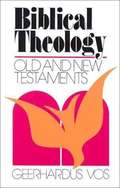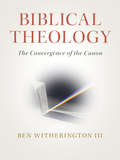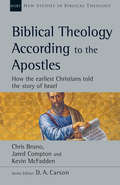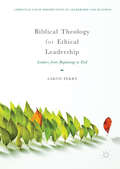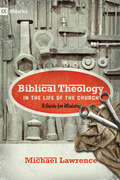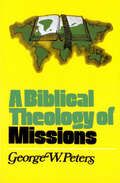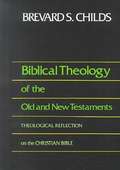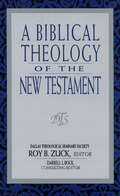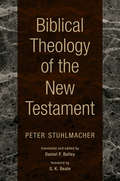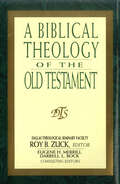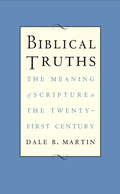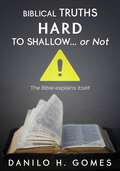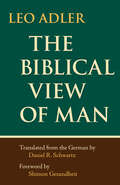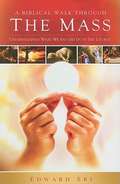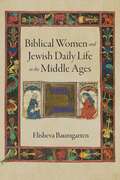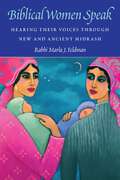- Table View
- List View
A Biblical-theological Introduction To The New Testament: The Gospel Realized
by Michael J. Kruger Guy P. Waters J. Ligon Duncan William B. Barcley Robert Cara Benjamin Gladd Charles E. Hill Reggie M. Kidd Simon J. Kistemaker Bruce A. LoweRead the New Testament from a biblical-theological perspective. <p><p> Featuring contributions from nine respected evangelical scholars, this volume introduces each New Testament book in the context of the whole canon of Scripture, helping anyone who teaches or studies the Bible to apply it to the church today.
A Biblical-Theological Introduction to the Old Testament: The Gospel Promised
by Miles V. Van PeltWritten from a Reformed, covenantal, and redemptive-historical perspective, this introduction to the Old Testament invites readers to see the cohesive story of the Bible through the lens of the gospel promised from the beginning.
Biblical Theology: Essays Exegetical, Cultural, and Homiletical
by C. Clifton BlackAn essential collection of C. Clifton Black&’s best essays on the theology of the New Testament Clift Black is well known and widely loved for his exegetical acuity, his theological seriousness, his pastoral kindness, and the most delightful sense of humor in the biblical studies guild. All these qualities are amply displayed in these thirty essays written across four decades of his career, including four essays that are published here for the first time. Biblical Theology: Essays Exegetical, Cultural, and Homiletical represents the fruit of a lifetime of studying, preaching, praying, training pastors, walking in the light, and laughing in the valley of the shadow of death. Black&’s keen mind and pastoral heart make this volume a rich contribution to the field of biblical theology.
Biblical Theology: The God of the Christian Scriptures
by John GoldingayImagine someone who has spent a lifetime listening deeply and attentively to the full range of Scripture's testimony. Stepping back, they now describe what they have seen and heard. What emerges is a theological cathedral, laid out on the great vectors of Scripture and fitted with biblically sourced materials. This is what John Goldingay has done. Well known for his three-volume Old Testament Theology, he has now risen to the challenge of a biblical theology. While taking the New Testament as a portal into the biblical canon, he seeks to preserve the distinct voices of Israel's Scriptures, accepting even its irregular and sinewed pieces as features rather than problems. Goldingay does not search out a thematic core or overarching unity, but allows Scripture's diversity and tensions to remain as manifold witnesses to the ways of God. While many interpreters interrogate Scripture under the harsh lights of late-modern questions, Goldingay engages in a dialogue keen on letting Scripture speak to us in its own voice. Throughout he asks, "What understanding of God and the world and life emerges from these two testaments?" Goldingay's Biblical Theology is a landmark achievement—hermeneutically dexterous, biblically expansive, and nourishing to mind, soul and proclamation.
Biblical Theology: Introducing the Conversation (Library of Biblical Theology)
by Leo PerdueOne of the thorniest problems in theological study is the relationship between biblical studies on the one hand, and constructive theology on the other. Theologians know that the Bible is the core source document for theological construction, and hence that they must be in conversation with the best in critical study of Scripture. For many biblical scholars, the point of what they do is to help the biblical text speak to today's church and world, and hence they would do well to be in conversation with contemporary theology. Yet too often the two groups fail to engage each other's work in significant and productive ways. The purpose of the Library of Biblical Theology, and this introductory volume to it, is to bring the worlds of biblical scholarship and constructive theology together. It will do so by reviving biblical theology as a discipline that describes the faith of the biblical periods on the one hand, and on the other hand articulates normative understandings of modern faith and practice. In this volume the authors begin by providing an overview of the history and possible future of biblical theology. They introduce biblical theology as a fundamentally contrastive discipline, one that is neither dogmatic theology (seeking to explain the official teachings of a particular Christian tradition), nor is it a purely historical approach to Scripture, eschewing questions of the Bible's contemporary message and meaning. Rather, biblical theology takes seriously both the need to understand the message of Scripture in its particular historical context, and the need to address that message to questions that confront contemporary human life.
Biblical Theology: Old and New Testaments
by Geerhardus VosScholarly discussion of biblical interpretation.
Biblical Theology: The Convergence of the Canon
by Ben Witherington, IIIIn Biblical Theology, Ben Witherington, III, examines the theology of the Old and New Testaments as a totality. Going beyond an account of carefully crafted Old and New Testament theologies, he demonstrates the ideas that make the Bible a sacred book with a unified theology. Witherington brings a distinctive methodology to this study. Taking a constructive approach, he first examines the foundations of the writers' symbolic universe - what they thought and presupposed about God - and how they revealed those thoughts through the narratives of the Old and New Testaments. He also shows how the historical contexts and intellectual worlds of the Old and New Testaments conditioned their narratives, and, in the process, created a large coherent Biblical world view, one that progressively reveals the character and action of God. Thus, the Yahweh of the Old Testament, the Son in the Gospels, and the Father, Son, and Spirit in the New Testament writings are viewed as persons who are part of the singular divine identity. Sensitive to do a more than merely thematic reading of the Bible which strips texts out of their original context, Witherington's progressive revelation approach allows each part of the canon to be read in its original context and with its original meaning. The result is a Biblical theology that allows Jews and Christian's to dialogue about and appreciate the sacred scriptures in both testaments. The capstone work of an internationally known theologian, Biblical Theology also offers new insights on key theological issues, including the character of God, grace, covenants, salvation, election, and eschatology as they relate to the doctrine of God.
Biblical Theology According to the Apostles: How the Earliest Christians Told the Story of Israel (New Studies in Biblical Theology #Volume 52)
by Kevin McFadden Jared Compton Chris BrunoHow did the apostles understand the Old Testament?
Biblical Theology for Ethical Leadership: Leaders From Beginning To End (Christian Faith Perspectives In Leadership And Business Ser.)
by Aaron PerryThis book argues that ethical leadership without a theological foundation is lacking a firm foundation. It begins with a critical assessment of ethical leadership as a leadership theory, showing how ethics and theology became separated, creating the space for ethical leadership outside of theology. Nevertheless, the author argues that ethical leadership without a biblical basis is weak, though one need not be religious to embrace the leadership principles of biblical theology. Unfolding Christology, anthropology, eschatology, and contextualized leadership as four key aspects of biblical theology for ethical leadership, this book will appeal to those studying leadership, business, innovation, and entrepreneurship.
Biblical Theology in the Life of the Church: A Guide for Ministry
by Michael LawrenceCapitol Hill Baptist Church associate pastor Michael Lawrence contributes to the IXMarks series as he centers on the practical importance of biblical theology to ministry. He begins with an examination of a pastor's tools of the trade: exegesis and biblical and systematic theology. The book distinguishes between the power of narrative in biblical theology and the power of application in systematic theology, but also emphasizes the importance of their collaboration in ministry. <P><P> Having laid the foundation for pastoral ministry, Lawrence uses the three tools to build a biblical theology, telling the entire story of the Bible from five different angles. He puts biblical theology to work in four areas: counseling, missions, caring for the poor, and church/state relations. Rich in application and practical insight, this book will equip pastors and church leaders to think, preach, and do ministry through the framework of biblical theology.
A Biblical Theology of Missions
by George W. PetersThis exhaustive theology of missions focuses on theory and biblical mandates for missions as a vital part of theology. George Peters, a foremost missions authority, considers both liberal and conservative views, although his own stance is solidly evangelical.
A Biblical Theology of Missions
by George W. PetersThis exhaustive theology of missions focuses on theory and biblical mandates for missions as a vital part of theology. George Peters, a foremost missions authority, considers both liberal and conservative views, although his own stance is solidly evangelical.
Biblical Theology Of The Old And New Testaments: Theological Reflection On The Christian Bible
by Brevard S. ChildsThis monumental work is the first comprehensive biblical theology to appear in many years and is the culmination of Brevard Child's lifelong commitment to constructing a biblical theology that surmounts objections to the discipline raised over the past generation. Childs rejects any approaches that overstress either the continuity or discontinuity between the Old and New Testaments. He refuses to follow the common pattern in Christian thought of identifying biblical theology with the New Testament's interest in the Old. Rather, Childs maps out an approach that reflects on the whole Christian Bible with its two very different voices, each of which retains continuing integrity and is heard on its own terms.
A Biblical Theology of the New Testament
by David Lowery Darrell Bock W Hall Harris Mark Bailey Buist Fanning IIIA Biblical Theology of the New Testament gives fresh insight and understanding to theological discipline. Scholars from Dallas Theological Seminary combine to create this important volume edited by Roy B. Zuck. Each contributor looks at divine revelation as it appears chronologically in the New Testament canon, allowing you to witness God's truth as it has unfolded through the decades.
A Biblical Theology of the New Testament
by David Lowery Darrell Bock W Hall Harris Mark Bailey Buist Fanning IIIA Biblical Theology of the New Testament gives fresh insight and understanding to theological discipline. Scholars from Dallas Theological Seminary combine to create this important volume edited by Roy B. Zuck. Each contributor looks at divine revelation as it appears chronologically in the New Testament canon, allowing you to witness God's truth as it has unfolded through the decades.
Biblical Theology of the New Testament
by Peter StuhlmacherFirst English edition of an iconic work of German scholarshipSince its original publication in German, Peter Stuhlmacher&’s two-volume Biblische Theologie des Neuen Testaments has influenced an entire generation of biblical scholars and theologians. Now Daniel Bailey&’s expert translation makes this important work of New Testament theology available in English for the first time.Following an extended discussion of the task of writing a New Testament theology, Stuhlmacher explores the development of the Christian message across the pages of the Gospels, the writings of Paul, and the other canonical books of the New Testament. The second part of the book examines the biblical canon and its historical significance. A concluding essay by Bailey applies Stuhlmacher&’s approach to specific texts in Romans and 4 Maccabees.
Biblical Theology of the New Testament
by Peter StuhlmacherFirst English edition of an iconic work of German scholarshipSince its original publication in German, Peter Stuhlmacher’s two-volume Biblische Theologie des Neuen Testaments has influenced an entire generation of biblical scholars and theologians. Now Daniel Bailey’s expert translation makes this important work of New Testament theology available in English for the first time.Following an extended discussion of the task of writing a New Testament theology, Stuhlmacher explores the development of the Christian message across the pages of the Gospels, the writings of Paul, and the other canonical books of the New Testament. The second part of the book examines the biblical canon and its historical significance. A concluding essay by Bailey applies Stuhlmacher’s approach to specific texts in Romans and 4 Maccabees.
A Biblical Theology of the Old Testament
by Eugene Merrill Thomas Constable Homer Heater Jr Roy Zuck Robert Chisholm JrA Biblical Theology of the Old Testament gives fresh insight and understanding to this theological discipline. Scholars from Dallas Theological Seminary combine to create this important volume edited by Roy B. Zuck. Each contributor looks at divine revelation as it appears chronologically in the canon, allowing you to witness God's truth unfold through the centuries.
A Biblical Theology of the Old Testament
by Eugene Merrill Thomas Constable Homer Heater Jr Roy Zuck Robert Chisholm JrA Biblical Theology of the Old Testament gives fresh insight and understanding to this theological discipline. Scholars from Dallas Theological Seminary combine to create this important volume edited by Roy B. Zuck. Each contributor looks at divine revelation as it appears chronologically in the canon, allowing you to witness God's truth unfold through the centuries.
Biblical Truths: The Meaning of Scripture in the Twenty-first Century
by Dale B. MartinA leading biblical scholar's landmark work challenges the historical realism that has dominated the discipline for more than two centuries How can a modern person, informed by science and history, continue to recite the traditional creeds and confessions of the Christian church? What does the Bible mean and how do we verify biblical truths? In this groundbreaking book, a leading biblical scholar urges readers to be more creative interpreters of biblical texts, mapping out an alternative way of reading that is not first and foremost about understanding what those texts would have meant for the original authors and readers. Limiting our study to the ancient meaning of the text, he argues, has produced either bad history, or bad theology, or both. One cannot derive robustly orthodox Christian doctrine or theology from a mere "historical" interpretation of the Bible. Martin offers instead theological readings of the New Testament that are faithful to Christian orthodoxy as generally understood, but without attempting a "foundationalist" understanding of the meaning of the text. His provocative and ambitious book demonstrates how theology and scripture can remain vital in the twenty-first century.
Biblical Truths Hard to Shallow… Or Not: The Bible explains itself
by Danilo H. GomesHow can you be sure your beliefs are biblically correct? Do they offer you? The amount of lies spread among the present times is alarming. Laziness or the frenetic pace of everyday life has distanced Christ's followers from the Holy Scriptures and their eternal and profound truths. BIBLICAL TRUTHS HARD TO SWALLOW… OR WILL NOT provoke - or offend - you as your certainties are shaken and the truths revealed. This is a set of quickly answered ringtones based on the Bible. Discover the facts that will surprise you like never before.
The Biblical View of Man
by Daniel R. Schwartz Leo Adler Shimon GesundheitThe Biblical View of Man argues cogently that the Bible is more about human beings than about God and insists that, in the biblical view, what human beings need is not so much wisdom or grace but rather their own free will to fulfill the obligations that a loving God has bestowed upon them in order to allow them to prove and improve themselves. According to Rabbi Leo Adler, the exercise of such free will, rather than implying a lack of need for God, actually requires a firm commitment to God. First published in German in 1965, this engaging interpretation of the Bible appears in English for the first time.
A Biblical Walk Through the Mass
by Edward SriFrom the moment of our creation and throughout biblical history, God has desired to enter into an intimate communion with humanity. In fact, God, who loves us beyond comprehension, has chosen to give us His very Body, Blood, Soul, and Divinity in the Eucharist. It can truly be said that the Catholic Mass is the most amazing event on earth. As Catholics, the Mass is the center of our Faith. We celebrate it every day. We know all the responses. We know all the gestures. But do we know what it all means? In A Biblical Walk Through the Mass, Dr. Edward Sri takes us on a unique tour of the Liturgy. Based on the revised translation of the Mass that goes into effect Advent 2011, this book explores the biblical roots of the words and gestures we experience in the Liturgy and explains their profound significance. This intriguing look at the Mass is sure to renew your faith and deepen your love and devotion to the Eucharist. Book jacket.
Biblical Women and Jewish Daily Life in the Middle Ages (Jewish Culture and Contexts)
by Elisheva BaumgartenIn Biblical Women and Jewish Daily Life in the Middle Ages, Elisheva Baumgarten seeks a point of entry into the everyday existence of people who did not belong to the learned elite, and who therefore left no written records of their lives. She does so by turning to the Bible as it was read, reinterpreted, and seen by the Jews of medieval Ashkenaz. In the tellings, retellings, and illustrations of biblical stories, and especially of those centered around women, Baumgarten writes, we can find explanations and validations for the practices that structured birth, marriage, and death; women's inclusion in the liturgy and synagogue; and the roles of women as community leaders, givers of charity, and keepers of the household.Each of the book's chapters concentrates on a single figure or a cluster of biblical women—Eve, the Matriarchs, Deborah, Yael, Abigail, and Jephthah's daughter—to explore aspects of the domestic and communal lives of Northern French and German Jews living among Christians in urban settings. Throughout the book more than forty vivid medieval illuminations, most reproduced in color, help convey to modern readers what medieval people could have known visually about these biblical stories. "I do not claim that the genres I analyze here—literature, art, exegesis—mirror social practice," Baumgarten writes. "Rather, my goal is to examine how medieval Jewish engagement with the Bible offers a window onto aspects of the daily lives and cultural mentalités of Ashkenazic Jews in the High Middle Ages."In a final chapter, Baumgarten turns to the historical figure of Dulcia, a late twelfth-century woman, to ponder how our understanding of those people about whom we know relatively more can be enriched by considering the lives of those who have remained anonymous. The biblical stories through which Baumgarten reads contributed to shaping a world that is largely lost to us, and can help us, in turn, to gain access to lives of people of the past who left no written accounts of their beliefs and practices.
Biblical Women Speak: Hearing Their Voices through New and Ancient Midrash
by Rabbi Marla J. FeldmanWhat were biblical women thinking and doing when the men around them received all the attention and glory? How did Leah, Rachel, and their handmaids negotiate the complicated family dynamics of four women vying for Jacob&’s affections? What compelled Potiphar&’s wife to risk her high station to seduce Joseph, an enslaved foreigner? How did the midwives and Pharoah&’s daughter conspire to rescue baby Moses, right under Pharoah&’s nose?Biblical Women Speak employs midrash (interpretative techniques) to discover ten biblical women&’s stories from a female point of view and provide insights beyond how ancient male scholars viewed them. Each chapter brings alive a different biblical woman, including non-Israelite characters and others who are neglected in classical rabbinic texts, such as Keturah (Abraham&’s last wife), Bat Shuah (Judah&’s wife), Shelomith (the infamous blasphemer&’s mother), and Noah (one of Zelophehad&’s brave daughters who demanded inheritance rights). After each featured text we hear a creative retelling of the woman&’s story in her own voice, followed by traditional midrash and medieval commentaries and the author&’s reflections on how these tales and interpretations are relevant for today. Rabbi Marla J. Feldman&’s book is an engaging invitation to enter biblical narratives, challenge conventional wisdom, and recalibrate the stories and lessons through the lens of our own lives.
